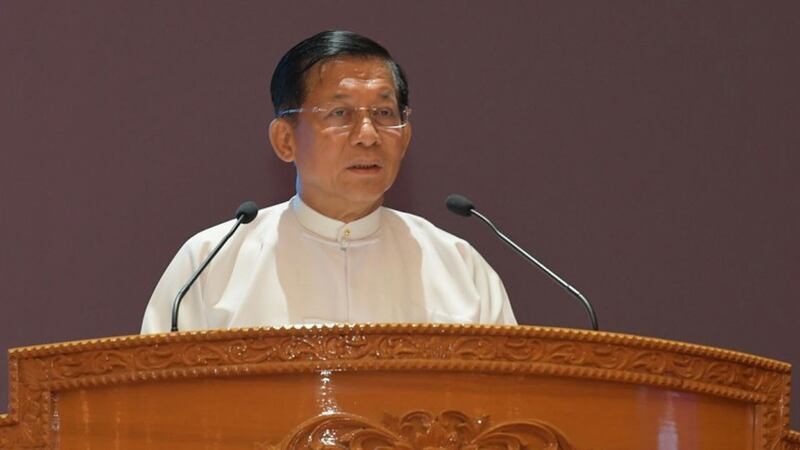U.S. sanctions on two of Myanmar’s state-owned banks aimed at cutting off funds to the military regime are making the junta “furious,” military officials have acknowledged, prompting the junta to pivot to banks in India, China and Thailand to conduct foreign currency transactions.
The sanctions, announced in June, are linked to the Myanmar military’s purchases of arms from foreign sellers and ban American citizens or companies from doing business with Myanmar Foreign Trade Bank and Myanmar Investment and Commercial Bank.
Maung Maung Win, the junta’s deputy minister of planning and finance, admitted the impact the move has had in a news conference in the capital Naypyidaw on Tuesday.
"By sanctioning [the banks], our government’s services for the nation and the people – including education, health, and infrastructure construction, as well as foreign currency acquisition and spending – have been affected,” he said.
“Export and import entrepreneurs, foreign banking service providers, individuals and departmental organizations have been hurt, too.”
Maung Maung Win suggested that the U.S. government’s reason for sanctioning the two state-owned banks is “not concrete,” adding that “different and biased interpretations” of the sanctions have been made by different countries and banks.
In announcing the sanctions, the U.S. accused both banks of “facilitating the regime’s use of foreign currency to procure arms” which it has used to kill civilians since orchestrating a coup d’etat in February 2021. It said the banks “primarily function as foreign currency exchanges and enable the conversion of kyat to U.S. dollars and euros and the reverse.”
Since the sanctions were put in place, United Overseas Bank, one of Singapore’s largest banks, announced earlier this month that it would suspend all bank-to-bank operations with Myanmar starting Sept. 1. Sonali Bank, which is owned by the Bangladesh government, also announced last week that it had frozen accounts for the two banks with a total value of more than US$1.1 million.
Junta ‘furious’ over sanctions
The sanctions and their impact have made the military regime “furious,” according to businessmen who attended a meeting with junta Central Bank Chairwoman Than Than Swe in Naypyidaw over the weekend.
They told RFA that she vowed to retaliate against the measures and said Myanmar would pursue stronger links to banks in India, Thailand and China.
“She also said that they are trying to use more of these connections to increase trade not only across the border, but also through sea transport," one of the businessmen said, speaking on condition of anonymity citing security concerns.
A banking expert, who also declined to be named, said the junta’s pivot to banks in China, India and Thailand will only serve as a “short-term fix” for dealing with U.S. sanctions and its dearth of U.S. dollars.
“These banks may only be able to help the junta to a certain extent,” he said. “But in the long run, if the United States takes further steps in its sanctions, they will not be able to protect the junta in the long term.”
Following the U.S. sanctions, the Myanmar kyat plunged to one-third of its value prior to the coup, while prices for the U.S. dollar and gold nearly tripled. As a consequence, the price of fuel and basic food products have skyrocketed, hurting the public.

Aung Thu Nyein of the Institute for Strategy and Policy (ISP-Myanmar) told RFA that the junta’s strict policies since the coup are to blame for the decrease in value of the kyat, inflation and the fleeing of foreign investment.
“Our kyat has plunged in terms of currency exchange rates and business transactions have become difficult as a result,” he said. “Business cannot function under the military’s increasingly strict policies … and now we are seeing these problems play out.”
The sanctions appear to be adding to the junta’s frustrations.
In comments delivered via video to the 11th Moscow Conference on International Security held on Aug. 15, junta chief Senior Gen. Min Aung Hlaing accused “some countries” of using the U.S. dollar “as a weapon” in transactions related to fuel, fertilizers and other goods needed for food security.
Call for additional measures
But while the impact of the sanctions may be making the lives of average citizens more difficult, shadow National Unity Government Presidential Spokesperson Kyaw Zaw called them “righteous” because the money in the banks “belongs to the people of Myanmar,” not the junta.
He also called for stronger measures against the military regime.
“We would like to urge the international community, including neighboring countries, to take further actions against the junta, in addition to those of the U.S., so that the flow of finances and foreign currency to the junta can be stopped,” he said.
The bank sanctions announced in June were not the first to target the junta in the aftermath of the coup.
In February 2021, nine days after the takeover, the U.S. government issued a sanction order against Myanmar’s military and froze US$1 billion belonging to the junta.
Translated by Myo Min Aung. Edited by Joshua Lipes.
